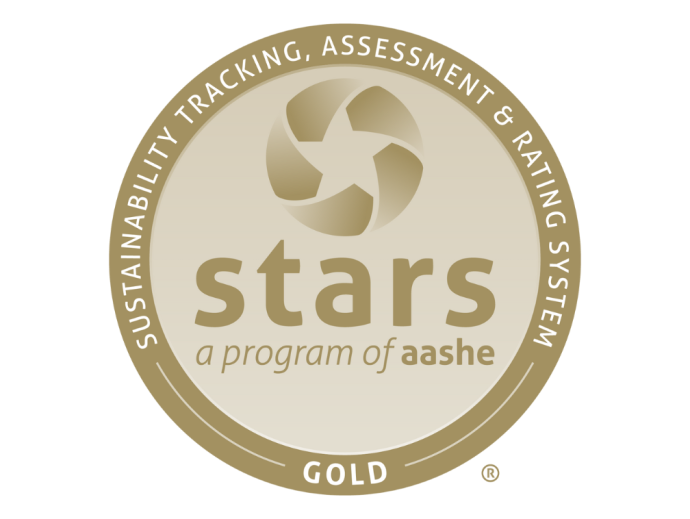Penn Earns STARS Gold Rating for Sustainability Achievements

The University of Pennsylvania has earned a Gold Rating in recognition of its sustainability achievements from the Association for the Advancement of Sustainability in Higher Education (AASHE). The achievement underscores Penn's comprehensive approach to sustainability, exemplified by meeting 100% of the goals outlined in the University’s sustainability strategic plan.
Penn Earns STARS Gold Rating for Sustainability Achievements
The University of Pennsylvania has earned a Gold Rating in recognition of its sustainability achievements from the Association for the Advancement of Sustainability in Higher Education (AASHE). The achievement underscores Penn's comprehensive approach to sustainability, exemplified by meeting 100% of the goals outlined in the University’s sustainability strategic plan.

The University of Pennsylvania has earned a Gold Rating in recognition of its sustainability achievements from the Association for the Advancement of Sustainability in Higher Education (AASHE). STARS, which stands for the Sustainability Tracking, Assessment & Rating System, measures and encourages sustainability in all aspects of higher education. The globally recognized benchmarking system measures Penn’s sustainability performance across five categories, including academics, campus and public engagement, operations, planning and administration, and innovation and leadership
With more than 1,200 participants in 52 countries, AASHE’s STARS program is the most widely recognized framework in the world for publicly reporting comprehensive information related to a college or university’s sustainability performance. Participants report achievements in five overall areas: 1) academics 2) engagement, 3) operations, 4) planning and administration, and 5) innovation and leadership.
The achievement, based largely on data from fiscal year 2023, underscores Penn's comprehensive approach to sustainability, exemplified by meeting 100% of the goals outlined in the University’s sustainability strategic plan, Climate & Sustainability Action Plan 3.0 (CSAP 3.0). Compiled by the Penn Sustainability office in coordination with partners across the university, the STARS report highlights significant progress in areas such as sustainability research, sustainability literacy assessments, emissions reductions, and commuting alternatives to single-occupancy vehicles, all priorities outlined in CSAP 3.0.
"We’re proud of the STARS Gold rating because sustainability is among Penn’s highest priorities and central to our strategic framework, In Principle and Practice," says Penn Facilities & Real Estate Services Senior Vice President Anne Papageorge. "We bring together education and research with campus planning and operations for impactful results that matter to our community and beyond. This aligns with our university mission, and STARS provides a system that holds us to a high standard."
Key highlights of Penn's sustainability achievements include:
- Research: Climate, environment, and sustainability research is a major focus at Penn, with more than 1,100 faculty members engaged in related research across 78 academic departments and all of the university’s 12 schools. The Environmental Innovations Initiative leverages the United Nations Sustainable Development Goals to analyze faculty research impact.
- Teaching: Through the Integrating Sustainability Across the Curriculum program, faculty and lecturers receive support to embed sustainability into new or existing courses. The program fully funds paid student research assistants who assist instructors in updating course materials, developing assignments, and integrating sustainability-focused teaching methods.
- Climate & Energy: Penn signed a landmark Power Purchase Agreement in 2020 to develop two large-scale solar energy facilities with a combined capacity of 220 megawatts. The facilities, which became operational in December 2023, are expected to produce the equivalent of approximately 70% of the university’s electricity emissions. This major initiative advances Penn’s goal of achieving 100% carbon neutrality by 2042.
- Purchasing: Penn implemented Climate Impact Offset charges, applying fees to university-funded air travel. These funds are used to counteract air travel emissions through carbon offsets and investments in local environmental initiatives such as air quality improvements and urban heat island reduction. This program aligns with Penn’s Climate and Sustainability Action Plan 3.0 and underscores the university’s commitment to sustainable travel.
- Transportation: In Spring 2023, Penn’s Sustainability Office, in collaboration with PennPraxis conducted a Commuter Survey that gathered over 4,000 responses from employees across 28 schools and divisions. The survey found that 72% of Penn employees’ commuting trips on average are made using an alternative to single-occupancy vehicles.
- Building Design & Construction: Nearly all of our newly constructed or renovated building spaces were certified under LEED (Leadership in Energy and Environmental Design), a green building rating system. This includes close to 1 million gross square feet certified as LEED compliant, including new and renovated spaces such as the Graduate School of Education’s renovation and addition, the Stouffer College House renovation, and the recent construction of Gutmann College House.
- Outreach & Community Partnerships: Penn received a top rating for its Climate Week and Earth Week outreach campaigns, raising awareness of environmental causes. It similarly received a top rating for its work with communities, including with the Netter Center for Community Partnerships to create mutually beneficial partnerships with surrounding communities through the ABCS Courses Initiative, and with the City of Philadelphia’s Office of Sustainability to develop plans for the city’s adaptation to extreme heat events.
"For nearly 20 years, Penn has been actively working to advance climate and sustainability efforts, and for over a decade, Penn has utilized STARS to transparently communicate the breadth and depth of our collective efforts," says Penn’s Sustainability Director Nina Morris. "Penn will continue to build on our strong foundation to meet our climate and sustainability goals."
To learn more about Penn’s Gold Rating, read the full report on AASHE's website.
--
About AASHE: AASHE is an association of colleges and universities that are working to create a sustainable future. AASHE’s mission is to empower higher education to lead the sustainability transformation. It provides resources, professional development and a network of support to enable institutions of higher education to model and advance sustainability in everything they do, from governance and operations to education and research. For more information about AASHE, visit www.aashe.org.